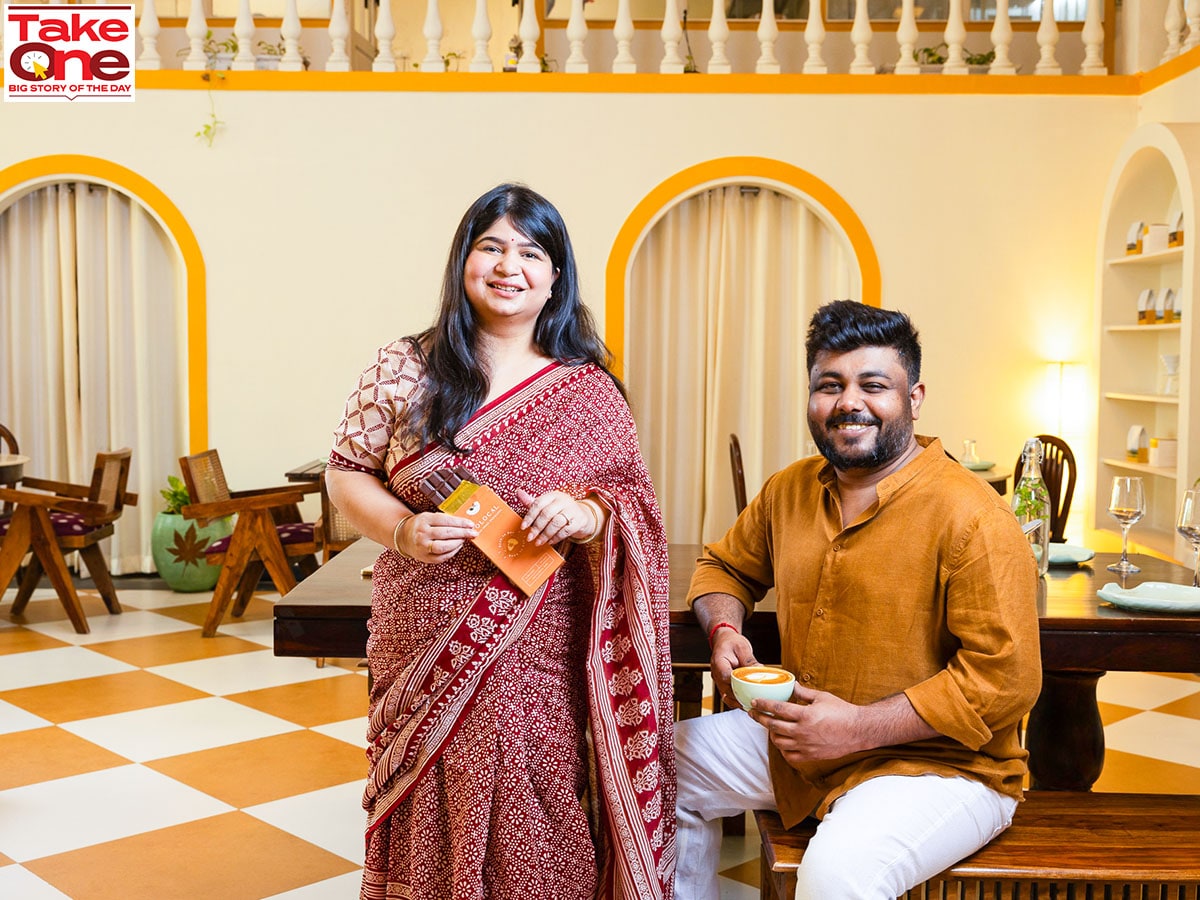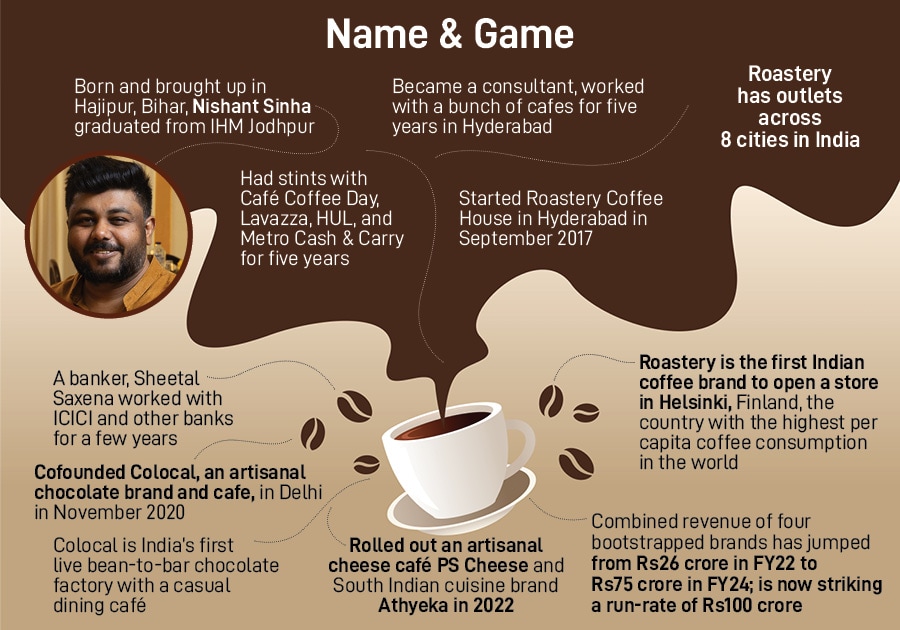 (From right)Nishant Sinha, founder, Roastery Coffee House and Sheetal Saxena, founder, Colocal chocolates. The coffee chain offers speciality coffees sourced from single estate coffee farms while offering Colocal handcrafted chocolates.
(From right)Nishant Sinha, founder, Roastery Coffee House and Sheetal Saxena, founder, Colocal chocolates. The coffee chain offers speciality coffees sourced from single estate coffee farms while offering Colocal handcrafted chocolates.
Image: Madhu Kapparath
Towards the end of 2006, Nishant Sinha found himself in a pickle. The lad from Hajipur, Bihar, had fought formidable odds to continue with his hotel management course in Jodhpur, Rajasthan. In 2004, his father’s modest food and catering business had nosedived; there were slim chances of a rebound. Even if it did happen, the recovery would be prolonged. His father was in the dilemma of using the lone family silver—a small piece of land—either for resurrecting a dying business, or punting on the prospects of his son who had a lousy academic track record. The doting father decided to back his underdog son who had flunked in Class 12, who was under pressure from his relatives to pursue medicine or engineering, and who now wanted to study hotel management.
Despite the dice loaded against his son, the businessman yielded to his paternal instinct. He sold the property, used the money to foot the college fee, and believed his son had what it takes to make it big in the hospitality world. “You have fire in your belly. Never let it die,” he told his son, who found the crushing weight of expectations overwhelming. Sensing his unease, the father reassured the young man. “If you are in love with what you are doing, nobody can take away your love and lover,” he added.
Three years later, Sinha’s love, and opportunity, were being snatched away. In the penultimate year of the hotel management course, the young student was barred from sitting for campus placement interviews of top hospitality brands, including Oberoi and the Taj. “Weak students are not allowed to sit in the cream job interviews,” was the unofficial rule of the college. Coming from a Hindi-medium background, Sinha did his best to brush up on his rudimentary English, overcome his dominant native accent, polish his soft skills, and cope with his city-bred peers who were fluent in English and scored high in exams. The diligent trainee from the cow belt, though, couldn’t score enough marks, was denied an opportunity to make a big-bang debut with top hotel brands, and settled for interviews with QSR chains. Lady Luck didn’t smile. Sinha was rejected even by McDonald’s, Domino’s and KFC.

On the last day of the campus placement, destiny brewed a ‘consolation’ cuppa. Sinha got a job with Café Coffee Day (CCD). With a meagre salary of Rs6,000 per month, the operational trainee joined CCD’s Delhi airport outlet and used to log in close to 15 hours every day. “I fell in love with coffee, and had to work harder than the rest,” he says, justifying the long duration of his work. “Coffee became my life,” adds Sinha, who relocated to Hyderabad after a year and joined rival Lavazza. The Italian brand honed the skills of the greenhorn. “I learned the art of roasting, mastered the science behind the back-end operations, and developed a wide network of farmers,” he says. Over the next decade, he added more heft to his armoury and skills at HUL, Metro Cash & Carry, and as an independent consultant working with a bunch of small café chains in Hyderabad.

In 2017, Sinha discovered his entrepreneurial bean and started Roastery Coffee House, a specialty coffee brand. The trigger to become an entrepreneur was interesting. During his stint as an independent consultant, Sinha noticed an interesting problem. “Cafes were focusing on ambiance and food menu. Coffee was not the hero but a supporting actor,” he recounts. What gave confidence to take the plunge was his strike rate in reviving the sagging fortunes of small cafes in Hyderabad. “I didn’t want to start a plain-vanilla and copycat coffee brand,” he says, adding that the idea of Roastery was to serve Indian-origin single-state coffee sourced from the finest coffee farms across the country, build a community of coffee lovers, and Indianise the art of making and serving coffee. “So, no takeaway for us. We do table service. No foreign culture-inspired interiors and architecture,” he says. “The brand is Indian in look, feel, and taste. We wanted to be known for serving single-state specialty coffee,” he adds.
Also read: Cool Beans: Can 93 Degrees strike it hot?
Seven years into the venture, Sinha had made Roastery a formidable specialty brand in India. It has recently opened an outlet in Helsinki, Finland, making Roastery the first Indian coffee brand to enter the European market. In terms of growth, the bootstrapped and profitable brand has clocked growth at a fast clip. Revenues have jumped from Rs26 crore in FY22 to Rs75 crore in FY24. During the same period, the brand has expanded from three stores across three cities to five stores in six cities. By early November of this year, Sinha added three more stores and took the city count to eight. “The opportunity for us is massive,” he says, adding that at 0.07 kg, India’s per capita consumption of coffee is among the lowest in the world. In Finland, he underlines, the equivalent number is over close to 12 kg. “The India brew story has just started,” he reckons.

Industry analysts are impressed with Roastery’s growth trajectory. “The team at Roastery is on a journey to create a premium ‘grown in India’ specialty coffee brand,” says KS Narayanan, a food and beverage expert. The brand offers coffee enthusiasts an opportunity to savour exceptional brews either at their cafes or in retail packs. Expanding their presence through cafes in multiple cities, Roastery is providing a space where coffee lovers can immerse themselves in the nuances of fine coffee and experience the full spectrum of flavours in an inviting and curated atmosphere, he adds. “As a high-end offering, the brand focuses on a more intimate and refined coffee experience,” he says.
Sinha’s gambit has come at the right time in the evolution of coffee–and specialty coffee–consumption in India. There is a rapidly expanding market for specialty coffee driven by a confluence of trends: Rising coffee consumption, increasing urbanisation, growing global travel, and the influence of social media. As more consumers seek premium, gourmet experiences, there is a demand for high-end coffee that goes beyond the basics. The brands such as Roastery are catering to those who appreciate the artistry and craftsmanship behind every cup. The specialty coffee market, with its focus on distinct flavour profiles, small-batch roasting, and unique origin stories, offers an opportunity to deliver an elevated experience that resonates with discerning coffee lovers. Additionally, sustainability, fair trade practices, and a deep connection to the coffee’s origins are becoming key pillars of consumer preference. “The trend aligns perfectly with the growing demand for ethically sourced and transparent products,” Narayanan says.

What makes Sinha’s entrepreneurial journey fascinating is not only Roastery, but also a slew of brands he is building with his wife Sheetal Saxena. A former banker, Saxena gained interest in the process of chocolate making after her marriage in 2018 and co-founded artisanal chocolate brand Colocal in 2020. The duo has a craft cheese brand—PS Cheese—and a rustic South Indian cuisine brand ‘Athyeka.’ Together with Roastery, the couple’s food and beverage empire is now clocking a revenue run-rate of Rs100 crore. (see box) “I always wanted to start my venture and chocolates came at the right time in my life,” says the chocolatier who rolled out the flagship store in Delhi in November 2020. “Colocal is India’s first live bean-to-bar chocolate factory,” she claims, adding that the artisanal chocolate brand was launched to bring Indian cacao farmers to the world stage and redefine the chocolate indulgence experience. The brand, she underlines, uses cacao sourced from the southern states of India.

Heady growth over the last five years, an expanding portfolio of four diverse brands, and now opening shop in Finland, do the couple have too much on their plate? Sinha reckons he has an appetite for more. “I don’t subscribe to the school of thought that believes that ‘more’ means a diffusion in focus,” he contends, adding that the cofounders have been careful not to be over-aggressive in their ambition and expansion. Globally, as well as in India, he underlines, there are examples of how business families—Tatas to Ambanis to Birlas–have stitched together and built a diverse and vast empire of brands. “The key is fire in the belly. I still have it, and I will grow as long as it’s burning brightly,” he says. “We are scripting an India story, and it will be a powerful story,” he signs off.
